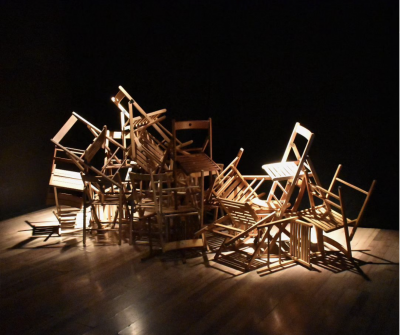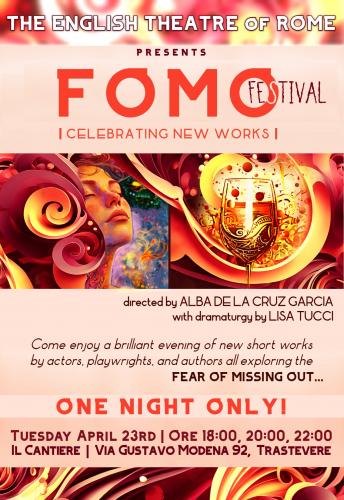FOMO Festival Review - monologues evoke fear of missing out

ROME -- At the intimate studio of Il Cantiere, in Trastevere, audiences were treated to a captivating exploration of the human psyche through the lens of FOMO – the fear of missing out. The one-night-only FOMO festival showcased a series of eight monologues, directed by Alba de la Cruz Garcia and produced by Gaby Ford. The monologue is a difficult act to pull off, though tempting in its simplicity, any flaws within the writing or delivery can be highly exposing for the actor. This wasn’t the case last Tuesday, April 23, with each actor delivering a detailed and diverse performance, taking the audience on a personal journey from comedy to grief, to gender struggles.
The festival opened with Lisa Tucci’s ‘The Price is Right’, a woman with a slightly manic demeanour taking to the stage to reminisce on her privileged upbringing. Delving further into her backstory and relationship with an overly generous father, we witness the protagonist candidly explain her journey into the arms of a married man, painting a vivid picture of a Bonnie and Clyde-esque love affair, ultimately culminating in the tragic murder of her lover's wife. Tucci skilfully riddles the performance with references to prisons, pre-empting the first climactic reveal of the evening, finally unzipping her jacket to expose her orange prison attire below.
Transported back to the year 1823 for the second performance of the evening, the audience found themselves immersed in Jane Trina's poignant performance, Man Up I’. A young female poet grappling with the societal constraints of her time, Trina explores how her character opted to publish her work under the pseudonym Roberto Smith, only for a man to then claim ownership of it. Trina closes her first monologue, by integrating the often-criticised plot device of time travel in a bid to then explore women’s rights in the modern world.
In Act 3’s highly moving performance ‘Beyond the Bend’, Emily White’s character shifts the focus from her own fears of missing out to the stark realisation of her grandfather’s absence in her life since his passing. Beginning with the retrospection of cherished memories, the narrative gradually evolves, traversing through anger, bargaining, and ultimately settling into a calm, palpable sense of despair. Simultaneously chopping fruit throughout the performance, White carefully captures the idea of loss and longing that looms with grief.
In contrast to the highly charged emotions of the preceding acts, "Don't Think" by Roberto Ferrara offers a counterpoint, delving into the unravelling psyche of a man grappling with the complexities of masculinity in the 21st century. In the character’s relentless pursuit of suppressing his emotions, the language of the piece descends into a staccato-like rhythm of rhyme and repetition, further detaching the character from the world of business, women, and family life around him. Ferrara’s performance invites the audience to reflect on the internal struggles faced by modern men and the notion of masculinity in today’s world.
The fifth performance of the evening, ‘Dream House’ by Antonella Nifosì explores the inner thoughts of a middle-aged woman. Pensive and poetic, the audience joins Nifosì’s character as she reflects back on the 1970s. With freedom of the space, Nifosì captures the audience with her dynamic performance, her movements across the stage falling in line with the poetic nature of her monologue.
As we moved on to Lisa Beer’s monologue, it somewhat felt like watching a stand-up comedy performance. Beer guides the audience through her character’s transformation from a meek office worker into the poster girl for 21st-century womanhood. Yet, amidst the laughter, we were drawn into a poignant entropic dance scene eventually descending into an entropic dance scene. Like many of the performances, we are eventually pulled back to some form of reality through the grand reveal.
Transporting us to 15th-century Milan, Sile O'Broin narrated the captivating tale of Caterina Sforza, the Duke of Milan’s illegitimate daughter thrust into the drama of noble politics. The phrase "an illustrious woman" echoed throughout, encapsulating Sforza's indomitable spirit as she seized control of Castel St Angelo, during a momentous act of defiance.
Jane Trina remerged to close the evening, revisiting the story of Roberta who had now moved forward in time to the present day. A character filled with hope following 200 years of female empowerment once again encountered a workplace tainted with misogyny.“It seems my only crime was being born a woman” offered a fair summary of many of the performances from the evening.
Amidst the brilliance of each individual performance, the rapid succession of these highly charged monologues left little time for reflection, resulting in a slight lack of emotional and thematic cohesion. Perhaps a reordering of the program could have allowed for a more immersive and impactful experience, granting the audience the space to fully absorb each narrative before delving into the next.
The evening, however, was a testament to the power of story telling, and the hard work and creativity of the cast and crew.

© COPYRIGHT ITALIAN INSIDER
UNAUTHORISED REPRODUCTION FORBIDDEN


